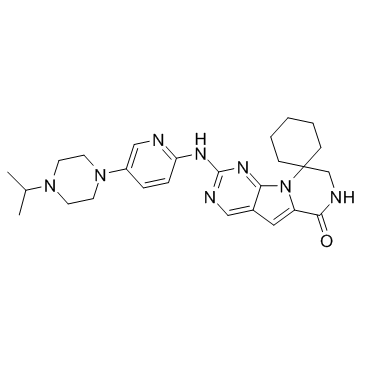Lerociclib (G1T38) (Synonyms: G1T38) |
| Catalog No.GC34163 |
Lerociclib (G1T38) (G1T38) est un inhibiteur puissant et sélectif de CDK4/6, avec des IC50 de 1 nM, 2 nM pour CDK4/CyclinD1 et CDK6/CyclinD3, respectivement.
Products are for research use only. Not for human use. We do not sell to patients.

Cas No.: 1628256-23-4
Sample solution is provided at 25 µL, 10mM.
Lerociclib (G1T38) is a potent and selective inhibitor of CDK4/6, with IC50s of 1 nM, 2 nM for CDK4/CyclinD1 and CDK6/CyclinD3, respectively.
Within the CDK family, Lerociclib is least selective against CDK9/cyclin T, ~30 fold between CDK4/cyclin D1 and CDK9/ cyclin T at the biochemical IC50. Lerociclib produces a robust and sustained G1 arrest in CDK4/6 dependent cells with an EC50 of ~20 nM. A dose dependent increase of cells in the G1 phase of the cell cycle is observed when CDK4/6 dependent WM2664 cells are treated with Lerociclib for 24 hours. This arrest is maintained through 300 nM, more than 300x the biochemical IC50. WM2664 cells treated with 30-1000 nM of Lerociclib for 24 hours exhibits a complete inhibition of RB phosphorylation compared to vehicle controls. Treatment with Lerociclib reduces RB phosphorylation within 1 hour post-treatment and generates near complete inhibition of RB phosphorylation by 16 hours post-treatment. Lerociclib produces a robust inhibition of proliferation in a diverse array of tumor cell lines including breast, melanoma, leukemia and lymphoma with EC50 concentrations as low as 23 nM[1].
In this HER2+ breast cancer model, Mice treated with Lerociclib elicits 8% tumor regression after 21 days of treatment while control animals have a 577% increase in tumor burden over the same treatment period. Compared to the vehicle-treated mice, daily treatment with 100 mg/kg of Lerocyclib or palbociclib shows tumor regression within 10 days in the MCF7 xenograft model. After 27 days of treatment, tumor growth inhibition is observed in the 10, 50, and 100 mg/kg Lerociclib cohorts (approximately 12%, 74%, and 90% inhibition, respectively). Daily oral palbociclib treatment causes an 18%, 66%, and 87% tumor growth inhibition in the 10, 50, and 100 mg/kg dosage cohorts, respectively. Interestingly, at 50 mg/kg, Lerociclib is significantly more efficaciou than palbociclib. Similar results are seen in the ER+ZR-75-1 breast cancer xenograft model when comparing Lerocyclib and palbociclib at the 50 mg/kg dose. Lerociclib treated mice exhibits 77% TGI with an overall 60% tumor growth delay demonstrating Lerocyclib alone is highly efficacious in this NSCLC tumor model.
[1]. Bisi JE, et al. Preclinical development of G1T38: A novel, potent and selective inhibitor of cyclin dependent kinases 4/6 for use as an oral antineoplastic in patients with CDK4/6 sensitive tumors. Oncotarget. 2017 Jun 27;8(26):42343-42358.
Average Rating: 5 (Based on Reviews and 26 reference(s) in Google Scholar.)
GLPBIO products are for RESEARCH USE ONLY. Please make sure your review or question is research based.
Required fields are marked with *




















